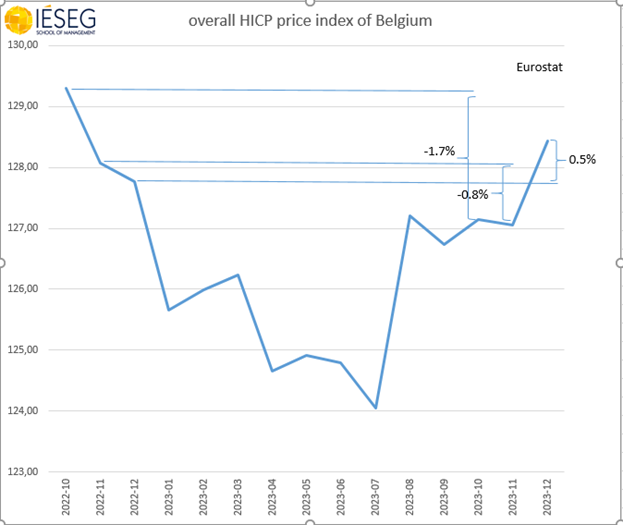After two months of being in the negative, Belgium's annual headline inflation rate rose in December by more than one percentage point.
Figures released by Statbel showed that Belgium's annual headline rate as measured by the Harmonised Index of Consumer Prices (HICP) – the EU's preferred inflation index – stood at 0.5% in December, compared with -0.8% in November and -1.7% in October, when the record low set in July 2009 was matched.
"There has indeed been a small upturn in inflation in November and December in Belgium," Eric Dor, the Director of Economic Studies at the IESEG School of Management, told The Brussels Times. However, levels remain considerably below those seen in October last year when it peaked at 13%.
He noted that this recent rebound of inflation is due to 'base effects", referring to the fact that the inflation rate of December 2023 is the rate of growth of consumer prices between December 2022 and December 2023.
"Therefore the inflation rate of a month depends on the level of prices of this month but also on the level of prices that prevailed during the same month of the previous year." In Belgium, this has resulted in a U-shape for price levels in recent times.
Understanding rise
October's price level index – a weighted average of the levels of prices of all the goods and services that are consumed – was lower than the price level index of October 2022, by 1,7%. The inflation rate of 2023 was therefore negative (-1.7%).
The inflation rate of November 2023 was still negative (-0.8%) but higher than the inflation rate of October 2023, even while the price level index was slightly lower.

"This is because the price level index of November 2022 was much lower than the price level index of October 2022. The decrease in the starting point had been higher than the decrease in the arrival point so the gap increased. This is typically an example of base effects," Dor explained.
In December 2023, the price level index was higher than the price level index of November 2022, but the price level index of December 2022 was lower than the price level index of November 2022. This meant a decrease in the starting point and an increase in the arrival point, resulting in the gap increasing.
Energy effect
Core inflation, which strips out energy and unprocessed food prices, was fairly stable at 5.5% in December, compared with 5.6% in November. This marks a continuing steady decline recorded since reaching a record high of 8.6% in March 2023.
As has been the case in recent months, Statbel noted that most of the decrease in inflation can be associated with lower energy prices. "The contribution of energy to inflation has been negative since January 2023 and now stands at -4.2%."
Electricity is now 35.5% less expensive than a year ago, while natural gas is 58.9% less expensive on an annual basis. However, this decrease is less pronounced than in November 2023, when electricity and gas prices were 42.1% and 71.2% cheaper respectively compared to November 2022.
Related News
- Energy prices continue to fall: Is now the time for a fixed contract?
- Belgium posts lowest eurozone inflation rate but highest monthly price increase
"While the dynamics of the level of the HICP price index have been mainly driven by the trajectory of the energy price level, the annual decrease in the energy price level has become less strong," Dor explained. It has therefore less depressed the overall inflation rate.
Belgium's headline rate is set to rise to 4.2% next year before dropping to 1.9% in 2025, according to the European Commission's most recent forecast.

